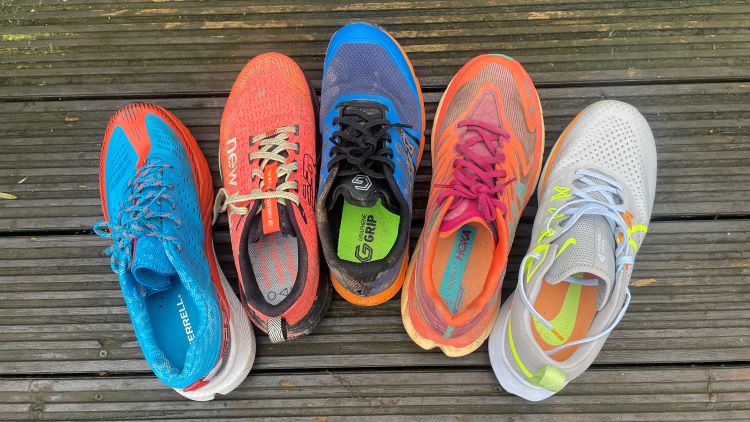If you’re doing a lot of off-road running, you’ll need a sturdy pair of trail shoes. Run-testers Kieran Alger and Steve Wright put the latest pairs through their paces to round up the best trail running shoes for any terrain.
Whether you’re chasing a PB on a mixed terrain 5km parkrun course, charging down a technical Alpine trail or cruising along forest paths, it’s important to wear the best trail running shoes. Even the best running shoes made for tarmac just won’t give you the grip, stability or agility to cope with the technical demands of off-road running. To help take your running further off the beaten track, we’ve put a selection of the latest trail running shoes through their paces.
Why you can trust Men’s Fitness
We spend hours testing every product or service we review, so you can be sure you’re buying the best. Find out more about how we test
These are the best trail running shoes
Whether you’re planning on racing or just enjoy training on trails rather than tarmac, we think you can’t go wrong with the Inov-8 Trailfly G270 V2. They excel at road-to-trail transitions, giving them great versatility, and are ultra-durable – especially for the price.
Other trail shoe recommendations
| Best for off-road racing | It’s no surprise that a carbon-plated shoe should be our pick for trail racing, but we’re also big fans of the punchy Profly X foam in the Hoka Tecton X2 as well as their grippy Vibram outsoles. |
| Best for wet-weather grip | We’re so impressed with the amount of wet-weather punishment you can mete out to the Brooks Cascadia 17 GTX and it never fails to offer confidence-inspiring grip and protection. |
| Best for value | The cheapest shoe on test, the Nike Pegasus Trail 4 is also one of the best at tackling road-to-trail transitions. It’s responsive and pacey and offers plenty of bite on softer trails too. |
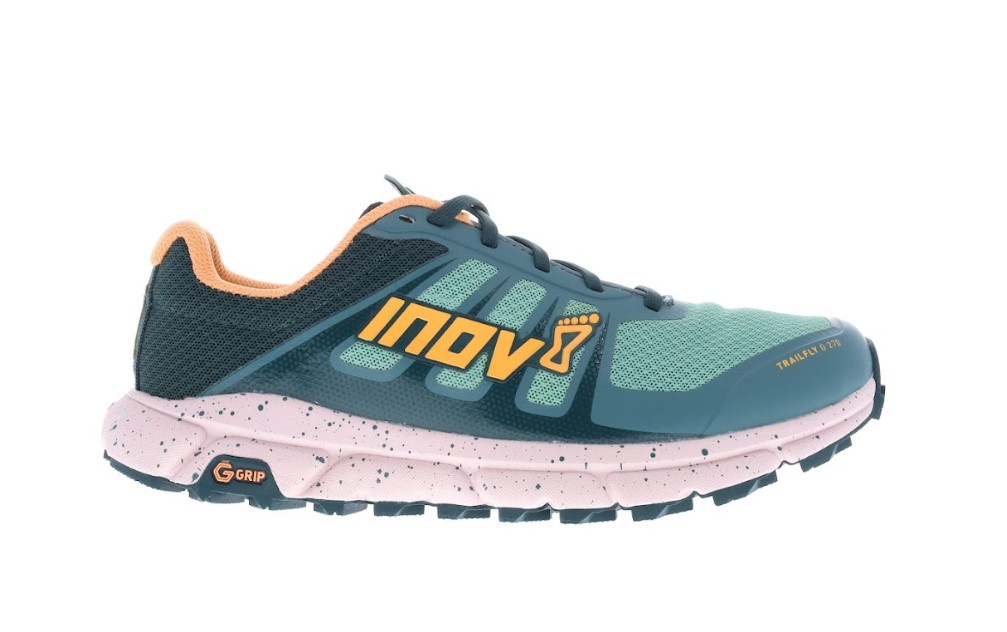
1. Inov-8 TrailFly G270 V2
Men’s Fitness verdict
How do you improve an award-winning trail shoe? Do what Inov-8 has done with its TrailFly G270 V2 and boost fit, comfort and durability while keeping the price competitive.- No-nonsense durability
- Fantastic grip
- Good for road-to-trail transitions
- May be too form for some runners
- Zero drop may not suit everyone
Inov-8 has improved an already impressive first-gen G270 by enhancing the fit, comfort and durability for this V2 model. All the things that made the G270 a great trail shoe are still here. Graphene-enhanced G-GRIP lugs, PowerFlow Max foam, Boomerang insole and zero-drop design are rolled over from the original. But we’ll testify to the fact that it’s even more agile and responsive than before.
- Read our full Inov-8 TrailFly G270 V2 review

2. Hoka Tecton X2
Men’s Fitness verdict
Fell runners and off-road ultra competitors will appreciate the speed and agility of the race-ready, carbon-plated Hoka Tecton X2.- Excellent for road-to-trail transitions
- Fast, agile and responsive
- Good cushioned protection
- Fit might be snug for some
- Grip struggles in trickier conditions
Hoka excels at making shoes to bring out your competitive streak, and we think the Tecton X2 is no different. Punchy Profly X foam and parallel carbon plates certainly help in that department. But there’s grip and stability too, thanks to the Vibram Megagrip with Litebase outsoles. Unlike some trail shoes with racing pretentions, the Tecton X2 still offers plenty of protection deep into multi-hour trail epics too.
- Read our full Hoka Tecton X2 review
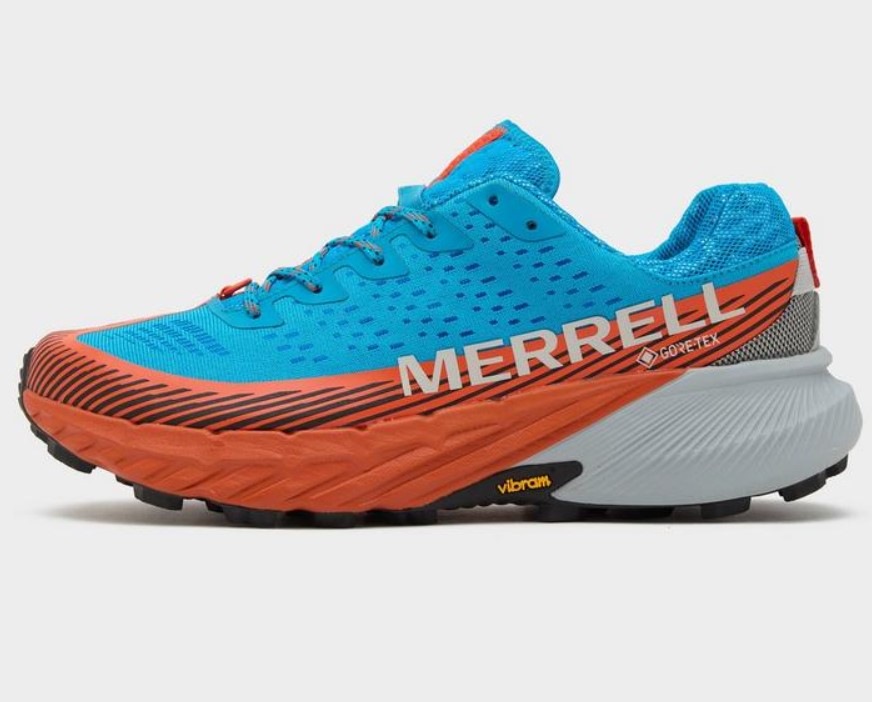
3. Merrell Agility Peak 5
Men’s Fitness verdict
With the Agility Peak 5, Merrell has shown it can do much more than just hiking shoes. This impressive daily trail shoe puts it right on the trail running map.- Good versatile all-rounder
- Excellent grip
- Plush long-run comfort
- Some heel slipping
- Higher stack limits ground feel
If you think Merrell only produces functional outdoor leisurewear, think again. The Agility Peak 5 trail shoe shows the company is upping its performance footwear game too. Substantial 5mm Vibram lugs, an energetic medium-density FloatPro foam, engineered mesh uppers with TPU overlays and a useful rock plate are just some of the Peak 5’s highlights. We’re also big fans of the gusseted wrap-around tongue, which prevents lace pinch.
- Read our full Merrell Agility Peak 5 review
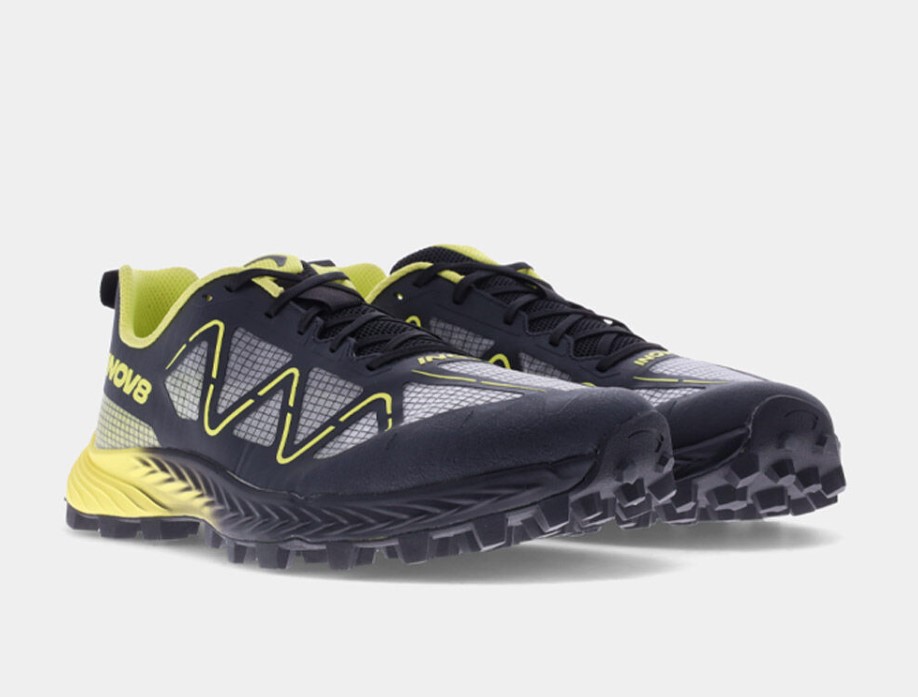
4. inov-8 Mudtalon Speed
Men’s Fitness verdict
If you want to compete in cross-country races without spikes, these Mudtalons would be at the top of our list. They offer good support and traction for logging off-road training miles too.- Lightweight and fast
- Grippy 8mm lugs
- Fast-draining Ripstop uppers
- High heel counter
- Limited cushioning in midsole
The 8mm lugs on the outsole of inov-8’s popular wet-weather trail shoe give the Mudtalon its name. They have helped us cope with long runs over some of the worst trail conditions imaginable. But how they also manage to also be race-capable off-road shoes is beyond us. They combine great support and traction with low weight and responsiveness, making them a very versatile choice for all kinds of trail running.
- Read our full inov-8 Mudtalon Speed review
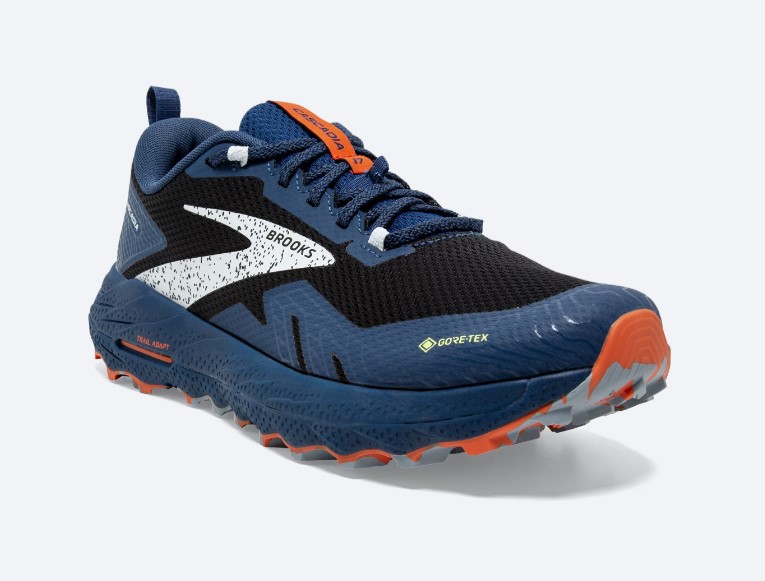
5. Brooks Cascadia 17 GTX
Men’s Fitness verdict
It’s a robust, waterproof shoe with good, responsive grip that’s suitable for long adventure runs and hikes. It wouldn’t be our choice for off-road racing or over long, hard courses though.- Solid shoe with comfortable fit
- Effective tread copes well in tough conditions
- Good longer distance multi-terrain shoe
- One of the heavier options
- Not suitable as a fast racing shoe
These may not be a choice for racing whippets. Instead the Brooks Cascadia 17 GTX shoes offer plenty of padding, protection and comfort. They are waterproof, too, with great responsive grip, and they excel on the muddy, slippery terrain that would leave most other shoes floundering. That responsiveness means you can run at a decent lick on sketchy terrain and keep your feet well cushioned over longer distances too. Overall, they’re an ideal choice for day-long trail adventures and wet-weather training runs.
- Read our full Brooks Cascadia 17 GTX review
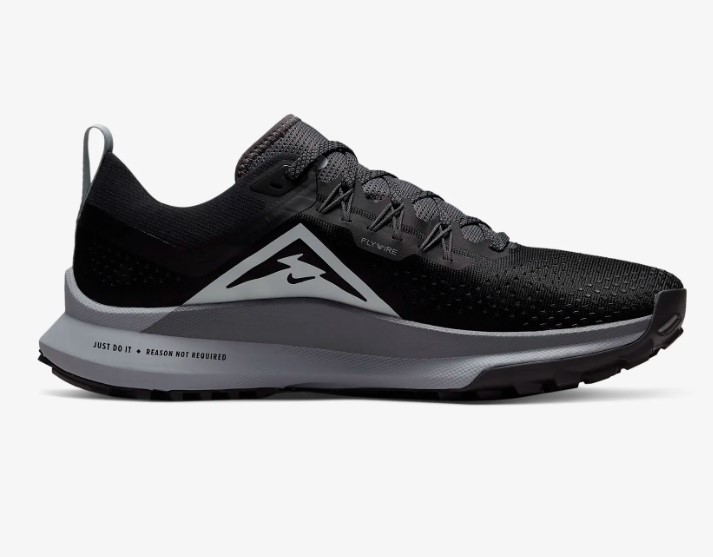
6. Nike Pegasus Trail 4
Men’s Fitness verdict
Look beyond the Nike Pegasus Trail 4’s road shoe-like exterior and you’ll find a lively, pacey all-rounder that excels on mixed surfaces.- Lively, responsive yet balanced ride
- Good road-to-trail all-rounder
- Performs across a range of paces
- Almost no toe-box protection
- No rock plate
The Nike Pegasus Trail 4 is a hybrid runner designed for trails as well as tarmac. Featuring the same Nike React foam you’ll find in the company’s Infinity Run daily trainer, the Pegasus Trail 4 has a responsive and springy ride. Strategically placed 4mm lugs provide plenty of bite on softer terrain. If you’re looking for a pacey all-rounder that you can use on a variety of surfaces, we think you can’t go wrong with the Pegasus Trail 4.
- Read our full Nike Pegasus Trail 4 review
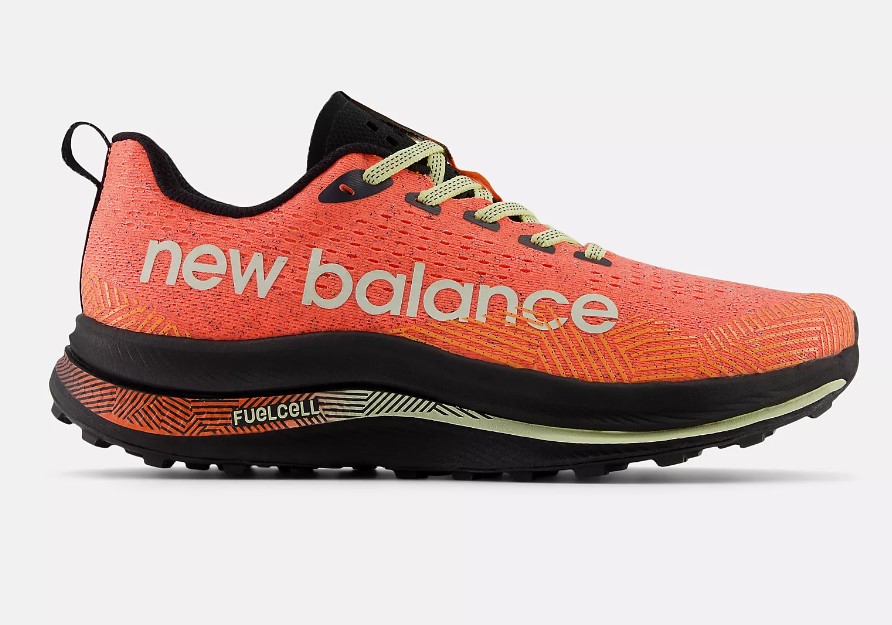
7. New Balance SuperComp Trail
Men’s Fitness verdict
New Balance’s SuperComp Trail – the off-road cousin of the racey SC Elite – is a carbon-plated whippet with race-winning credentials.- Light and punchy ride
- Good durability
- Copes well with road-to-trail transitions
- Short, tight and narrow fit
- Lacks some stability
- Can catch stones
It looks like a road shoe. It even feels like a road shoe. But any comparisons with its road cousin the SC Elite are dispelled as soon as you leave the black stuff behind. It complements the responsive FuelCell foam found in the SC Elite with a tougher, more resilient foam to give you confidence inspiring stability and enhanced durability. The forked carbon plate creates a light and punchy ride, too, allowing you to push anything up to 5km trail race pace. We think it’s the ideal choice for fast, technical trails.
- Read our full New Balance SuperComp Trail review
How we test the best trail running shoes
Our testers put each shoe through their paces over a mixture of distances and paces to see where they excel, and clocked up significant distances in each one to examine how they wear over time. Each reviewer focused on speed, stability and comfort during test runs, while also assessing the effectiveness of any high-tech features on offer. Their detailed reviews are sure to help you choose the right running shoe for you.
How are trail running shoes different to road running shoes?
Trail running shoes are built to handle rougher runs when you step off the more consistent and reliable surface of the road. These rugged running shoes have more aggressive rubber outsoles with deeper lugs to provide better grip and traction on slippery surfaces. Lug depth and patterns vary, with deeper lugs and aggressive lug patterns offering stickier grip in mud and more surface traction. If you’re running from road to trail or on firmer ground, shallower lugs provide grip without holding you back.
Some trail shoes also have reinforced uppers with toe-guard overlays around the toe box to protect your pinkies from accidental encounters with rocks and roots. They can also feature rock plates to prevent the lumps and bumps coming up through the midsole to batter your feet. This all tends to make them heavier than road shoes.
Speaking of battered feet, heading off road onto uneven ground creates a bigger challenge for your feet and ankles. That requires more support and stability. So trail shoes tend to have features to help, including a more robust build with increased structure in the heel, side walls and different midsole technology to ensure you have a reliable platform for picking your way along the paths.
There’s also a new trend for trail shoes to offer protection against water. Breathable GORE-Tex coatings are now common in a bid to keep feet dry. Though nothing’s going to prevent soggy socks if you go ankle deep into a big puddle, mind.
Some road-shoe DNA is now being transferred to trail shoes, too. That includes livelier, lightweight responsive foams, carbon plates and more aggressive superlight racy designs.
When should you wear trail shoes?
Trail running covers a very wide variety of terrain, including steep grassy fells, rocky mountain climbs and uneven coastal paths. Then there’s flat gravel paths that run alongside rivers, through forests or in parks. They can be clear, wide and groomed; steep, wild and muddy; and even sandy or slippery. Basically any time you venture off the road onto uneven, unpredictable terrain, you’ll want to consider lacing up a trail shoe. Though in drier, flatter, more groomed conditions, sometimes road shoes can still get the job done. And we’re seeing a big trend for do-it-all road-to-trail shoes that offer good versatility across a wider range of terrain.
Related content:

